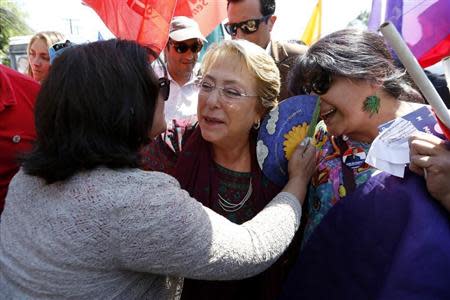Chileans expected to elect leftist Bachelet

By Rosalba O'Brien SANTIAGO (Reuters) - Chile is set to take a moderate turn to the left in elections on Sunday with the popular and charismatic ex-president Michelle Bachelet almost certain to win a triumphant return to power. Bachelet has promised to redress inequality by hiking taxes and putting cash into education and health, as well as rewriting the country's dictatorship-era constitution. Chile's free-market economy and rapid copper-fuelled growth have made it a Latin American success story in the last two decades. As it looks to join the ranks of developed nations, however, there are growing calls for its wealth and opportunities to be more equitably shared. Still, most voters want tweaks rather than wholesale change, and Bachelet's center-left proposals, as well as the evidence from her first term, suggest she will not adopt radical policies. "The societal model is not in play," said political analyst Guillermo Holzmann. Although voters are cool towards both Bachelet's leftist Nueva Mayoria coalition and the incumbent conservative Alianza bloc, Bachelet herself enjoys strong approval ratings. One recent poll suggested the 62-year-old may get the 50 percent she needs for a first-round victory over Alianza's Evelyn Matthei and seven other candidates on Sunday. That hasn't been done in 20 years. The poll said support for Bachelet was at 47 percent while Matthei polled 14 percent, although a different poll had Bachelet at 32 percent and Matthei at 20 percent. Chile switched from compulsory to voluntary voting last year. The move has made polling more complex, and could lead to a low turnout, surveys suggest. If there is no outright winner on Sunday, the two front-runners go through to a run-off on December 15. Pollsters think Bachelet should easily win a second round against Matthei, with supporters of the largely anti-establishment minor candidates likely to throw their weight behind her or abstain. Bachelet, a physician-turned-politician and a single mother, was the first woman to lead Chile, running the country between 2006 and 2010. Barred under the constitution from seeking immediate re-election, she has returned to Chile after leading the United Nations' gender equality body, U.N. Women. Her promise of sustaining economic growth while doing more to redistribute wealth appeals to many Chileans, said Katie Micklethwaite, an analyst at Control Risks Group. "Just growth on its own - well, people in Chile have had that for a long time and haven't necessarily seen that much improvement for it." CONGRESS VOTE CRUCIAL When the 60-year-old Matthei was chosen as Alianza's candidate in July, the stage was set for an intriguing showdown between two women whose families were caught up in the bruising events of the 1970s, when socialist Salvador Allende was overthrown in a bloody coup by General Augusto Pinochet. Bachelet and her father were victims of torture during the Pinochet years, while Matthei's father was a general in the dictatorship's junta. The two men - both in the air force - had been friends since being posted to the same military base in the 1950s, where their daughters played together as children. Matthei, a brusque former labor minister, has struggled to win over voters but even a heavy defeat for her would not necessarily mean that Alianza is thrust into the political wilderness. All 120 lower house seats and 20 out of 38 senate seats are also being contested on Sunday. Chile's electoral system - a Pinochet-era legacy that Bachelet wants to change - effectively gives the second-placed party an overweight representation. Unless Bachelet is able to overturn that disadvantage by persuading voters to back her coalition's congressional candidates in large numbers, Alianza will have the power to block substantive reforms. Changing the electoral system, for instance, would need the backing of three fifths of the Senate, or 23 senators. Nueva Mayoria currently has 20 in its bloc, while Alianza has 16, with two right-leaning independents. Bachelet will likely have to cut bargains with the right to get her reforms through, and in that process some of her proposals - she has promised 50 reforms in 100 days - may be lost or watered down, analysts say. Angry student protests demanding free and better education have hurt the administration of outgoing President Sebastian Pinera and are unlikely to come to an end with Bachelet's accession, particularly if there's political stalemate. That's despite the integration into Bachelet's bloc of the Communist Party and, potentially, former student leaders. Camila Vallejo, who shot to fame as the face of the student movement, is one of several running for a seat in the lower house. Voting will take place on Sunday between 8 a.m. and 6 p.m. (1100-2100 GMT), with the first results due at 7.30 p.m. (2230 GMT) or when 20 percent of the vote is counted. (Additional reporting by Antonio de la Jara; Editing by Kieran Murray and Paul Simao)
